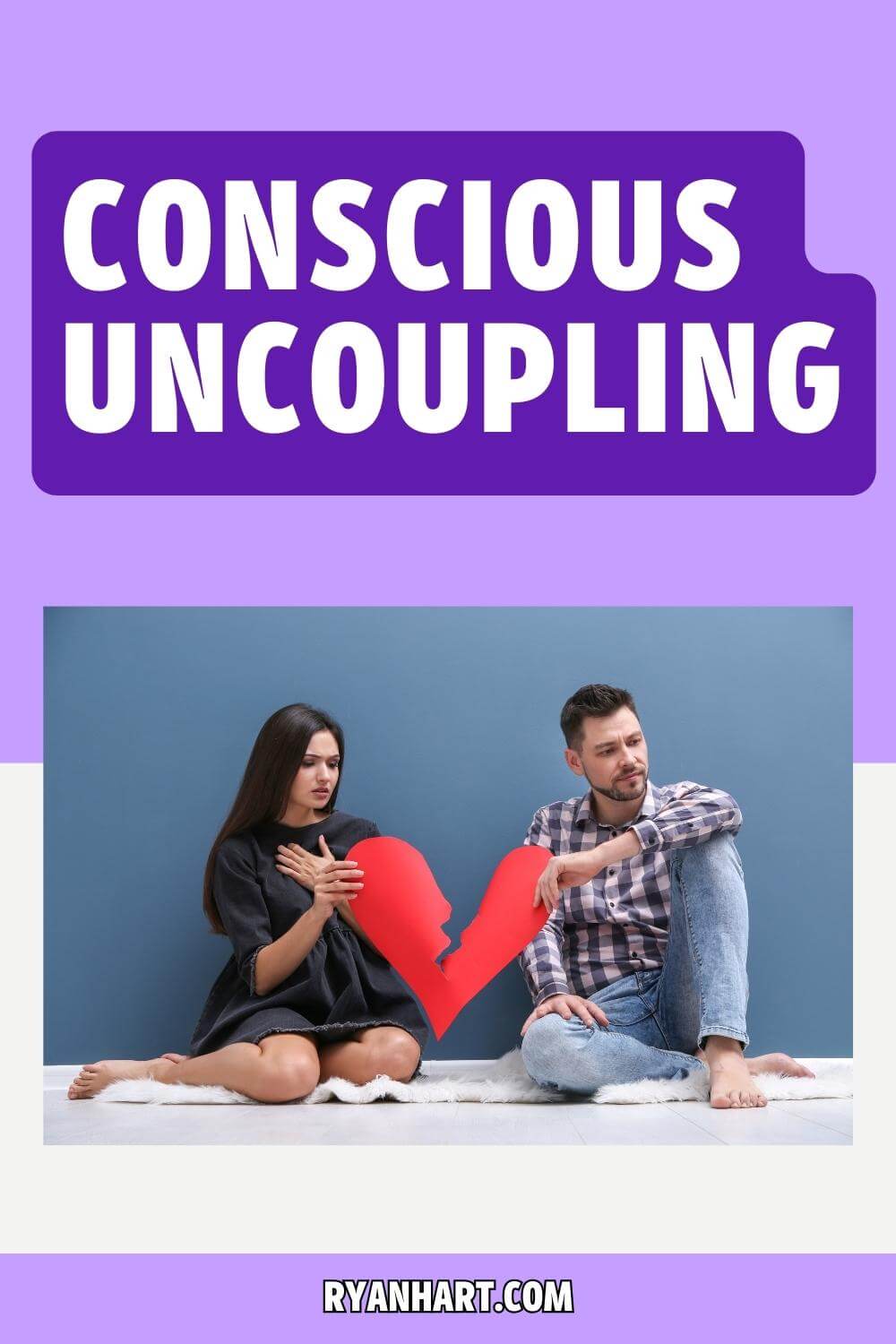Conscious Uncoupling in 5 Easy Steps
by Ryan Hart | Updated on May 15, 2024 | Post may contain affiliate links. As an Amazon Associate we earn from qualifying purchases.
Are you struggling with the pain of a breakup or anticipating a possible separation? Conscious uncoupling might be the solution you need.
Coined by psychotherapist and author Katherine Woodward Thomas, conscious uncoupling is a process that aims to help individuals navigate the end of a relationship healthily and respectfully.
Unlike traditional divorce, conscious uncoupling is a relatively amicable way to end a relationship. It involves a five-step process that enables individuals to overcome their grief and use it to transform their lives.
In this article, we’ll explore the concept of conscious uncoupling in more detail, including what it is, how it works, and the benefits it offers.

What is Conscious Uncoupling?
If you’ve heard the term “conscious uncoupling,” you may be wondering where it came from. The concept was first introduced by psychotherapist and author Katherine Woodward Thomas.
She created the term to describe a process for ending a relationship in a healthy, respectful, and compassionate way.
She developed a five-step process for ending a relationship that involves taking responsibility for your own feelings, focusing on the positive aspects of the relationship, and practicing self-care.
The five steps of conscious uncoupling are:
- Find Emotional Freedom
- Reclaim Your Power and Your Life
- Break the Pattern, Heal Your Heart
- Become a Love Alchemist
- Create Your Happily Even After Life
Conscious Uncoupling vs Uncoupling Theory
Sociologist Diane Vaughan proposed an “uncoupling theory” in 1976, which explored the process of ending a relationship. Her theory suggests that the dissolution of a relationship is a gradual process that involves a series of small decisions and actions.
Vaughan’s theory is based on the idea that relationships are not static, but rather, they change and evolve over time. She suggests that the process of uncoupling involves a series of “turning points” where one or both partners begin to disengage emotionally.
While Vaughan’s theory is not specifically focused on conscious uncoupling, it does provide a framework for understanding the gradual process of ending a relationship.
The Conscious Uncoupling Process
If you are going through a breakup, you might feel overwhelmed with emotions and unsure how to move forward. The Conscious Uncoupling Process is a five-step approach developed by Katherine Woodward Thomas that can help you transition out of a relationship with grace and clarity.
Principles of Conscious Uncoupling
The Conscious Uncoupling Process is based on a few key principles that can help you navigate the transition out of a relationship in a healthy way. These principles include:
- Taking responsibility for your own healing and growth
- Approaching the breakup with compassion and forgiveness
- Honoring the relationship and the lessons it taught you
- Letting go of blame and resentment
- Cultivating a sense of gratitude for the good times you shared
By embracing these principles, you can start to shift your perspective on the breakup and create space for healing and growth.
Stages of Conscious Uncoupling
The Conscious Uncoupling Process is broken down into five stages, each of which is designed to help you move through the transition with greater ease and clarity. These stages include:
- Find Emotional Freedom: This stage involves taking responsibility for your own healing and growth and working through any unresolved emotions that may be holding you back.
- Reclaim Your Power and Your Life: In this stage, you’ll start to take back control of your life and focus on your own goals and aspirations.
- Break the Pattern, Heal Your Heart: This stage involves examining the patterns and beliefs that may have contributed to the breakup and working to heal any wounds that may be keeping you stuck.
- Become a Love Alchemist: Here, you’ll learn how to transform your pain into wisdom and use it to create a more fulfilling future.
- Create Your Happily Even After Life: In the final stage of the process, you’ll start to envision a new future for yourself and take steps to make it a reality.
The Impact of Conscious Uncoupling
When going through a separation, it’s easy to get lost in the pain and heartbreak. However, conscious uncoupling is a process that can help you turn this breakdown into an opportunity for growth and personal development. Here are some ways conscious uncoupling can impact your life:
On Personal Growth
Conscious uncoupling is all about taking responsibility for your own emotions and actions. By doing so, you can learn from your mistakes and grow as an individual. This process can help you become more mindful of your own negative energy and learn how to let go of emotional trauma from your childhood. By doing so, you can achieve emotional freedom and find happiness in your own life.
On Relationships
Conscious uncoupling can also help you approach future relationships with more awareness and respect. By learning how to set boundaries and communicate effectively, you can enter into new relationships with a greater sense of intimacy and commitment.
Additionally, conscious uncoupling can help you accept personal failure and forgive your partner, leading to mutual respect and caring.
On Children
One of the most important aspects of conscious uncoupling is co-parenting. By approaching separation with dignity and balance, you can minimize the damage done to your children and create a positive environment for their growth.
Conscious uncoupling can help you learn how to co-parent with your ex in a way that prioritizes your children’s happiness and well-being. This can also help you avoid bitterness and anger towards your ex, creating a more positive atmosphere for your kids.
Famous Cases of Conscious Uncoupling
You may have heard of Conscious Uncoupling before, thanks to some famous cases that brought the concept into the mainstream. Here are some examples:
Gwyneth Paltrow and Chris Martin
Perhaps the most well-known case of Conscious Uncoupling is that of Gwyneth Paltrow and Chris Martin. The couple announced their split in 2014, using the term “conscious uncoupling” to describe their separation.
According to Paltrow, the term refers to “the process of being mindful throughout a breakup or divorce - honoring the love that was shared and the lessons learned while letting go of the aspects that no longer work.”
Paltrow and Martin’s approach to their separation was met with some skepticism and criticism, but the couple has remained amicable and co-parent their two children together.
Katherine Woodward Thomas
Katherine Woodward Thomas is a therapist and author who is credited with coining the term “Conscious Uncoupling.” She developed a five-step process for conscious uncoupling, which involves taking responsibility for your own healing and growth, finding emotional freedom, reclaiming your power and your life, breaking the pattern of unhealthy relationships, and creating a happy and fulfilling future.
Woodward Thomas’s approach has been embraced by many who are going through a breakup or divorce, and her book “Conscious Uncoupling: 5 Steps to Living Happily Even After” has become a bestseller.
Critiques and Controversies
While conscious uncoupling has gained popularity in recent years, it has also faced its fair share of critiques and controversies. Here are a few things to consider when exploring this approach to separation and divorce.
Resentment
One concern with conscious uncoupling is that it may not be possible for all couples to part ways with a sense of goodwill and generosity. If one or both partners harbor resentment towards each other, it may be difficult to approach the separation with an open heart and mind. In such cases, conscious uncoupling may not be the best approach.
Hope
Another critique of conscious uncoupling is that it may give false hope to couples who are struggling in their relationship. While it is true that some couples are able to successfully navigate a conscious uncoupling, it is not a guarantee that the relationship can be salvaged. If one or both partners are holding onto the hope that the separation will somehow lead to a reconciliation, they may be disappointed in the end.
Honor
Some critics have argued that conscious uncoupling places too much emphasis on honoring the relationship and not enough on honoring the individuals involved. While it is important to approach the separation with respect and kindness, it is also important to acknowledge that each person may have different needs and desires moving forward.
In some cases, conscious uncoupling may not allow for the necessary space and autonomy for each person to fully heal and move on.

Frequently Asked Questions
Does conscious uncoupling actually work?
Conscious uncoupling is not a magic solution that guarantees a smooth and painless separation. However, it is a way to approach the end of a relationship with more awareness, compassion, and respect for yourself and your partner.
By taking responsibility for your own feelings and actions and communicating in a clear and honest manner, you will be able to minimize the damage and maximize the growth that can come from a breakup.
What is the difference between conscious uncoupling and divorce?
In a divorce, the marriage is dissolved, and the division of assets, debts, and custody arrangements. Conscious uncoupling, on the other hand, is a personal and emotional process that focuses on the inner work of letting go, healing, and creating a new vision for your life. While divorce can be a part of conscious uncoupling, it is not the only or the primary goal.
What are some examples of celebrities who have gone through conscious uncoupling?
One of the most famous examples of conscious uncoupling is Gwyneth Paltrow and Chris Martin, who announced their separation in 2014 and coined the term in their joint statement.
Other celebrities who have talked about using conscious uncoupling principles include Miranda Kerr and Orlando Bloom, Jennifer Aniston and Justin Theroux, and Naomi Watts and Liev Schreiber.
What is the process for conscious uncoupling therapy?
Conscious uncoupling therapy can vary depending on the practitioner and the client’s needs, but it generally involves a series of sessions that focus on exploring and resolving the emotional patterns, beliefs, and behaviors that contribute to the breakup.
Some common techniques used in conscious uncoupling therapy include mindfulness, visualization, journaling, and somatic experiencing.
Are there any worksheets or resources available for conscious uncoupling?
Yes, there are many resources available for conscious uncoupling, including books, courses, workshops, and online programs. Some popular resources include Katherine Woodward Thomas’s book “Conscious Uncoupling: 5 Steps to Living Happily Even After,” her online course “The Conscious Uncoupling Journey,” and her certified coach training program.
There are also many free worksheets and exercises available online that can help you navigate the process of conscious uncoupling.
What are some quotes or sayings related to conscious uncoupling?
Some popular quotes and sayings related to conscious uncoupling include, “The end of a relationship is not a failure, but a completion,” “Letting go is not the same as giving up,” “The pain of a breakup is temporary, but the growth is permanent,” and “You can’t change the past, but you can choose your future.” These quotes reflect the idea that conscious uncoupling is not about avoiding or denying the pain of a breakup but about embracing it as an opportunity for growth and transformation.